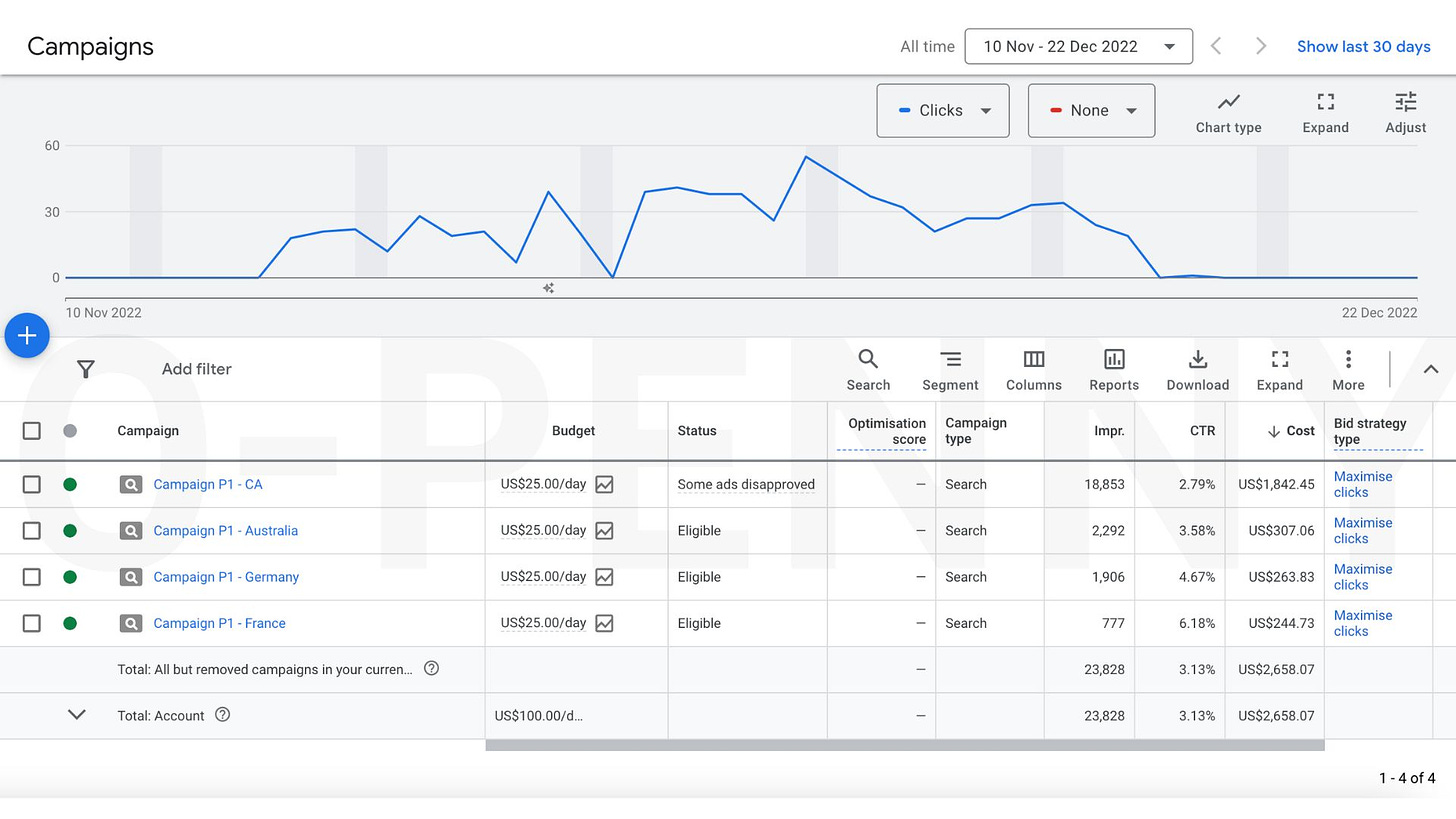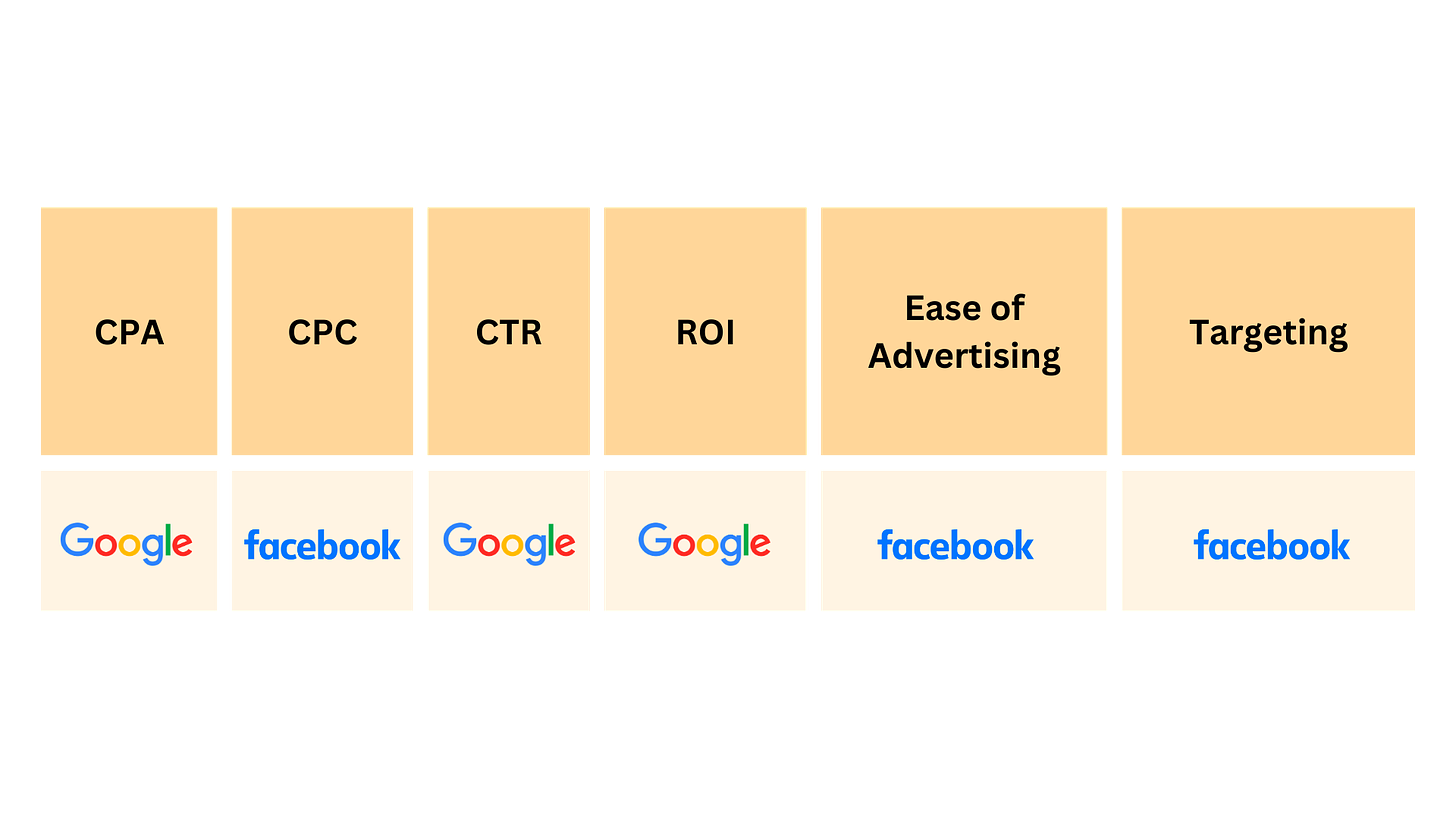Which platform is best for advertising gambling services: Facebook or Google?
The surprising winners and losers of gambling ad campaigns on Facebook and Google
Creative, Copy, Targeting & Keywords used for the campaigns attached at the end of the post. For both Google & Facebook. Enjoy!We analyzed ad campaigns on both platforms for a gambling business and collected a wide range of data to understand the factors that contributed to the campaigns' success or challenges.
Our findings offer a comprehensive and unbiased comparison of the strengths and weaknesses of advertising on Google and Facebook for the gambling industry.
Don't take a chance with your advertising budget – let our case study provide the guidance you need to make the best decision for your business and achieve your goals.
Understanding the context and challenges of the gambling industry
It is important to note that both Google and Facebook have policies in place that prohibit the promotion of gambling services on their platforms in certain regions or countries.
Failure to follow these policies can result in the removal of ads or the suspension of advertising accounts.
Despite the restrictions on advertising gambling services on Google and Facebook in certain regions or countries, we were able to run ad campaigns for a gambling business on both Google and Facebook for several months.
About the client
Kryptosino is a gambling business that operates exclusively online and accepts only crypto tokens as a form of payment.
The company offers a range of gambling services, including casino games, sports betting, and lottery.
In recent years, the gambling industry has been rapidly evolving due to the increasing popularity of online platforms and the adoption of new technologies, such as cryptocurrency. As a result, Kryptosino faced the challenge of effectively reaching and engaging its target audience in a crowded and highly competitive market.
To address this challenge, Kryptosino decided to launch ad campaigns on Google and Facebook in an effort to increase brand awareness and drive traffic to its website. The company set specific goals for the campaigns, including increasing website traffic and generating new customer leads.
In this case study, we will examine the results of the ad campaigns on Google and Facebook and assess their effectiveness in achieving these goals.
Strategy: Balancing compliance and effectiveness
When developing the ad campaign for Kryptosino on either Facebook or Google, we employed a range of tactics and techniques to optimize the performance of the campaign and achieve the client's business goals.
On Google, we used cloakers to protect the client's website from being flagged as inappropriate. On Facebook, we used a pre-lander for the same reason.
In addition to these tactics, we also carefully considered the wording of the ad text to ensure that it was compliant with the platform's policies and effectively conveyed the value and benefits of Kryptosino's gambling services to the target audience.
We worked closely with the client to understand their goals for the ad campaign and the message they wanted to convey, and used A/B testing to identify the most effective language and messaging.
Results: Measuring the impact of the ad campaigns on business goals
Analysis: Exploring the factors that contributed to the campaigns' success or challenges
Users on Facebook and Google often have different intentions when using these platforms, which can affect the results of an ad campaign.
On Facebook, users are generally more social and open to engaging with content and ads that are relevant to their interests and activities.
This can make Facebook a particularly effective platform for ad campaigns that focus on building brand awareness, generating leads, or engaging with users in a more personalized way.
On Google, users are typically more focused on finding specific information or products and are often in a more transactional mindset.
This can make Google a strong platform for ad campaigns that focus on driving traffic to a website or generating conversions, such as sales or sign-ups.
In our case study, we observed these differences in user intent and adjusted our ad campaign strategy accordingly on either Facebook or Google.
Although we used pre-landers with Facebook & cloakers with Google, the number of sign ups/FTDs generated were higher for Google. Even though we did not use any cryptocurrency related targeting on either platform. Purely, casino related.
It's worth noting that the cost of advertising on Facebook and Google can also vary significantly, with Google generally being more expensive due to its focus on driving traffic and conversions.
As a result, it is important to carefully consider the cost-benefit balance of advertising on each platform when developing an ad campaign strategy.
Comparing the results of the Google and Facebook ad campaigns
Cost of Acquisition
In our case study, we observed that the cost per acquisition (CPA) for the ad campaigns on Google was consistently lower than on Facebook.
There are a few potential reasons for this difference in CPA between the two platforms. One possibility is that the target audience for the ad campaigns on Google was more interested in the gambling services offered by the client and more likely to take action, such as signing up or making a purchase. This could have contributed to a lower CPA on Google, as fewer impressions were required to generate a conversion.
Another factor to consider is the type of ad format used on each platform. Google ads tend to be more text-based and focused on driving users to a website, while Facebook ads can be more visual and focused on building brand awareness or engagement. This difference in ad format could have also contributed to the difference in CPA between the two platforms.
Cost Per Click
According to our analysis, we observed that the cost per click (CPC) for the ad campaigns on Facebook was consistently lower than on Google.
There are a few potential reasons for this difference in CPC between the two platforms. One possibility is that the ad campaigns on Facebook were more successful at attracting clicks from the target audience. This could be due to the creative concept or messaging of the ads, the relevance of the ads to the target audience, or other factors.
Another factor to consider is the type of ad format used on each platform. Facebook ads can be more visual and focused on building brand awareness or engagement, while Google ads tend to be more text-based and focused on driving users to a website. This difference in ad format could also have contributed to the difference in CPC between the two platforms.
Click-through rate
During the course of our research, we found that the click-through rate (CTR) for the ad campaigns on Google was consistently higher than on Facebook.
This suggests that the ad campaigns on Google were more successful at attracting clicks from the target audience relative to the number of impressions.
There are a few potential reasons for this difference in CTR between the two platforms. One possibility is that the ad campaigns on Google were more relevant to the target audience and therefore more likely to be clicked on. This could be due to the targeting of the ads, the relevance of the ad copy or messaging, or other factors.
However, we believe that the Apple tracking issues played the biggest role here since Facebook is unable to collect the kind of data it used to earlier related to people’s interests.
On the other hand, the searches happen on Google and it has complete information about what the user wants.
ROI
In our case study, we observed that the return on investment (ROI) for the ad campaigns on Google was consistently higher than on Facebook. This suggests that the ad campaigns on Google were more effective at driving business results and achieving a positive return on the investment made in the campaigns.
One possible reason for this difference in ROI between the two platforms is the use of a cloaker with the Google ads. A cloaker is a tool that helps to ensure that the ads are delivered only to regions where gambling is legal and to protect the client's website from being flagged as inappropriate. By using a cloaker, we were able to optimize the performance of the Google ad campaigns and achieve better results for the client.
On Facebook, we used a pre-lander to provide additional information about the gambling services offered by the client and to ensure that users were only directed to the client's website if they met the eligibility criteria for gambling in their region. This tactic may have helped to improve the performance of the Facebook ad campaigns, but the ROI was still lower than on Google.
Ease of Advertising
It is important to note that both Facebook and Google have strict policies in place that prohibit the promotion of gambling services on their platforms. While it may be easier to advertise gambling on Facebook in some cases, it is still important to follow the platform's policies and guidelines to avoid having your ads rejected or your account suspended.
That being said, it is possible that Facebook may be more lenient in certain situations when it comes to advertising gambling services. This could be due to a variety of factors, such as the specific language or imagery used in the ads, the targeting of the ads, or the overall compliance of the ad campaign with Facebook's policies.
Targeting
It is true that both Facebook and Google have strict policies in place that prohibit the promotion of gambling services on their platforms, and that this can impact the targeting of ad campaigns.
On Google, it is generally more difficult to target users with gambling-related keywords due to the platform's policies. As a result, ad campaigns that promote gambling services may have to rely on more general or indirect keywords to reach their target audience. This can make it more challenging to effectively target users who are interested in gambling and could potentially impact the performance of the ad campaign.
On Facebook, the targeting options are generally more flexible and allow for more precise targeting based on a range of factors, such as demographics, interests, and behaviors. This can make it easier to reach users who are interested in gambling and potentially improve the performance of ad campaigns that promote gambling services.
However, it is important to note that both Facebook and Google have strict policies in place that prohibit the promotion of gambling services, and that these policies can change over time. As a result, it is important to carefully review and follow the policies of each platform to ensure that your ad campaigns are compliant and have the best chance of success.
Summarizing the key findings and recommendations for future campaigns
In conclusion, our case study demonstrated that both Facebook and Google can be effective platforms for advertising gambling services, although the results of the ad campaigns on each platform differed in some key areas.
On Facebook, we observed that the ad campaigns were more successful at building brand awareness and generating leads, although the return on investment (ROI) was lower compared to Google. On Google, we observed that the ad campaigns were more effective at driving traffic to the client's website and generating conversions, and the ROI was consistently higher than on Facebook.
Overall, our case study highlights the importance of understanding the differences in user intent and ad formats on each platform and adjusting the ad campaign strategy accordingly. By carefully analyzing the results and key metrics of ad campaigns on both Facebook and Google, businesses can make informed decisions about which platform is the best fit for their advertising goals and budget.
In the end, the best platform for advertising gambling services will depend on the specific business goals and audience of the advertiser, as well as the current policies and guidelines of each platform. By carefully considering these factors and closely monitoring the performance of ad campaigns, businesses can effectively reach their target audience and achieve their desired business results on either Facebook or Google
.Thank you for reading our case study comparing the performance of ad campaigns on Facebook and Google for a gambling company. We hope that you found the information and insights presented in this case study to be useful and relevant to your own advertising efforts.
If you have any further questions or would like to discuss the results of this case study in more detail, please don't hesitate to get in touch. You can reach us by Telegram, Whatsapp, Skype or by email at prakhar@0penny.com. We would be happy to help you with any questions or concerns you may have about advertising gambling services on Facebook and Google, or any other platform.
Thank you again for your interest in our case study. We look forward to helping you achieve your advertising goals and drive business results!
Creatives, Copy, Targeting & Keywords
Keep reading with a 7-day free trial
Subscribe to 0-Penny Case Studies to keep reading this post and get 7 days of free access to the full post archives.








